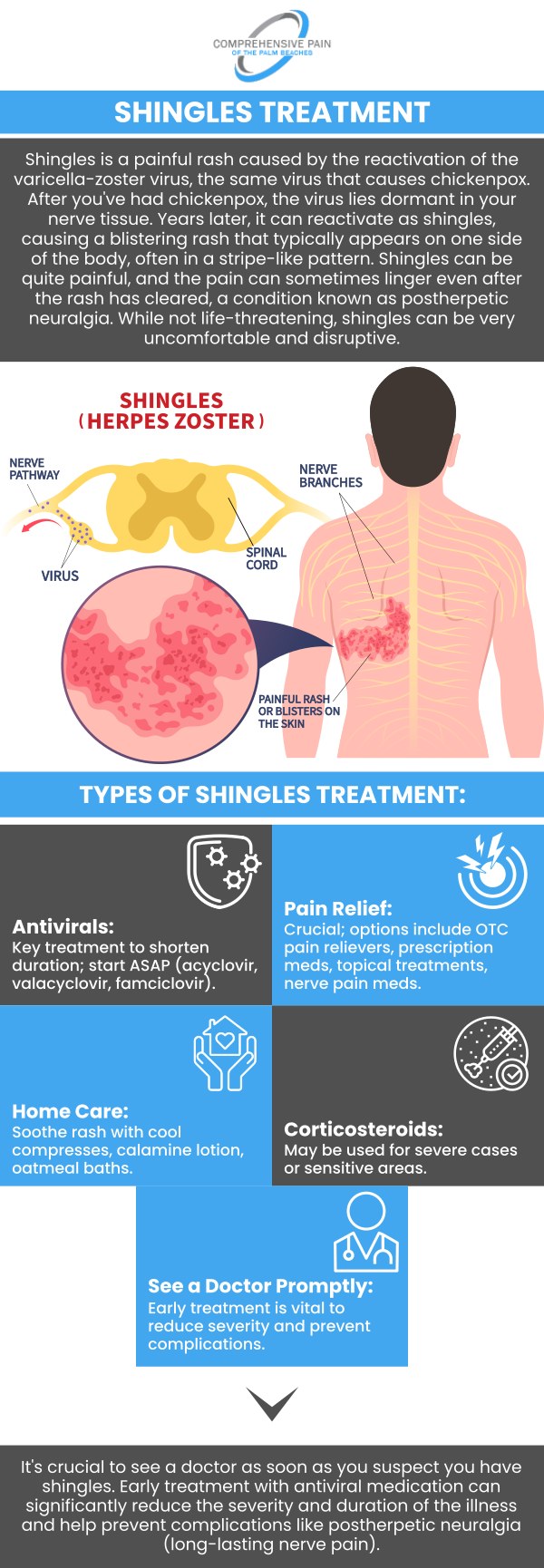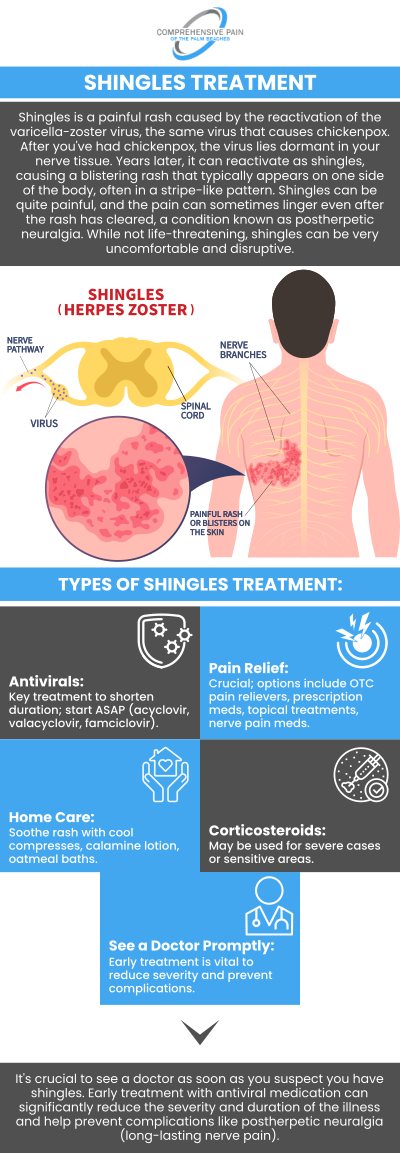Shingles Pain Treatment Specialist in Greenacres, FL
If you’re suffering from shingles pain, Dr. Bart Gatz, M.D., at Comprehensive Pain in Greenacres, FL, can help provide relief. Shingles pain can be intense and long-lasting, but with the right treatment, it can be effectively managed. Using the latest treatments and techniques, our team works with you to create a customized care plan for optimal recovery. Trust us to help you regain your comfort and quality of life. For more information, contact us or book an appointment online. We are conveniently located at 4897 South Jog Road, Greenacres, FL 33467.


Table of Contents:
What causes shingles pain to develop?
Can shingles pain occur without a visible rash?
Is shingles pain the same as nerve pain?
Does shingles pain get worse at night?
Shingles pain—including its persistent form known as postherpetic neuralgia—often requires specialized care, which is a cornerstone of our approach at Comprehensive Pain. This pain develops as a direct result of the reactivation of the varicella-zoster virus, the same virus responsible for chickenpox. After recovering from chickenpox, the virus remains dormant in the body’s nerve tissue for years, only to reactivate later—often due to age-related immune changes, stress, or underlying medical conditions.
When this virus reactivates, it travels along nerve fibers to the skin, causing significant inflammation and direct nerve damage. This nerve involvement explains the intense, burning, stabbing, or shooting pain that patients with shingles experience, sometimes even after the visible rash resolves. The damaged nerves become overly sensitive and send abnormal pain signals to the brain, resulting in chronic discomfort.
At Comprehensive Pain, we understand that the body’s inflammatory response to the viral infection can further aggravate the nerves, amplifying pain and making effective management crucial. The severity and duration of shingles pain can depend on factors such as the location of the affected nerves, the patient’s age, and how quickly antiviral treatment is initiated. Older adults and those with weakened immune systems are especially vulnerable to long-lasting, severe pain.
Our team is dedicated to providing individualized, evidence-based treatment plans for shingles pain and postherpetic neuralgia. We utilize a multidisciplinary approach—combining medications, interventional procedures, physical therapy, and supportive care—to help our patients regain quality of life and minimize suffering.
Yes, shingles pain can occur without a visible rash, a condition known as zoster sine herpete. Typically, shingles is characterized by a painful rash that develops on one side of the body, usually in a band or strip. However, in some cases, individuals experience the pain of shingles without the rash appearing. This often occurs before the rash is visible, or in rare cases, the rash never develops at all.
The pain associated with shingles is caused by the varicella-zoster virus, which lies dormant in nerve tissue after a person has had chickenpox. When the virus reactivates, it travels along nerve fibers, causing inflammation and pain. Even in the absence of a rash, this inflammation can cause sharp, burning, or tingling sensations, which are hallmark symptoms of shingles. The pain may be localized to a specific area of the body, typically along the nerve pathways affected by the virus.
It’s important to recognize that this pain, without the rash, can lead to a delayed diagnosis, which is why early recognition is key. Without the rash, doctors may initially misinterpret the pain as another condition, such as a pinched nerve or muscle strain. As shingles progresses, some individuals may eventually develop the rash, confirming the diagnosis.
If you experience unexplained, intense pain in a specific area, particularly if you’ve had chickenpox in the past, it’s important to seek medical attention. Early antiviral treatment can help reduce the severity and duration of shingles, even if a rash is not present.
At Comprehensive Pain, we understand that nerve pain—also known as neuropathic pain—can take many forms and significantly impact your quality of life. One common and particularly distressing type of nerve pain is caused by shingles, or herpes zoster. Shingles occurs when the varicella-zoster virus reactivates in your nerve tissues. This reactivation leads to inflammation and damage of the affected nerves, resulting in pain that is often described as burning, stabbing, or tingling and typically follows a band-like pattern on one side of the body.
While shingles pain is a specific form of nerve pain, nerve pain itself can arise from many different causes, including diabetes (diabetic neuropathy), nerve compression (such as sciatica), multiple sclerosis, and traumatic injuries. Regardless of the cause, nerve pain occurs when the nerves themselves are injured or damaged, leading to symptoms that can be challenging to manage.
At Comprehensive Pain, our team specializes in diagnosing the underlying causes of nerve pain and developing personalized treatment plans. With shingles, the pain often begins with the viral infection and nerve inflammation, but for some people, the discomfort continues even after the rash and blisters have healed. This persistent pain, known as postherpetic neuralgia, can be severe and long-lasting, requiring a comprehensive approach to management.
Understanding the difference between shingles pain and other types of nerve pain is essential for effective treatment. Our expert providers at Comprehensive Pain use the latest diagnostic tools and evidence-based therapies—including medications, nerve blocks, and advanced pain management techniques—to help you find relief, restore function, and improve your quality of life.
At Comprehensive Pain, we understand that shingles pain—also known as postherpetic neuralgia—can be especially challenging, often intensifying at night for many patients. This nighttime discomfort is a common experience and can be driven by several factors. During the day, distractions and daily activities can help take your mind off the pain, but at night, when the environment is quieter and you are trying to rest, pain can feel much more noticeable. Your body’s natural circadian rhythms may also play a role, sometimes heightening nerve pain sensations in the evening.
Other factors, such as lying still in bed, changes in room temperature, or even the gentle pressure from bedding or clothing, can aggravate sensitive skin and nerves affected by shingles. Anxiety about falling asleep or trouble getting comfortable can further make pain seem worse.
Our team is experienced in helping patients manage the unique challenges of shingles pain, especially when it disrupts sleep. If you’re finding your pain worsens at night, our providers can work with you to create a personalized pain management plan. This may include targeted medications, topical therapies, advanced interventional options, and practical lifestyle adjustments to help you sleep more comfortably.
Effective management of shingles pain is crucial for your recovery and maintaining your quality of life. If you are struggling with nighttime pain, don’t hesitate to reach out to Comprehensive Pain. We’re here to support your healing and help you get the restful sleep you need. For more information, contact us or book an appointment online. We are conveniently located at 4897 South Jog Road, Greenacres, FL 33467. We serve patients from Port St. Lucie FL, Stuart FL, Palm City FL, Greenacres FL, Palm Springs FL, Boynton Beach FL, and surrounding areas.
Check Out Our 5 Star Reviews



Additional Services You May Need
▸ Knee Pain
▸ Arthritis
▸ Back Pain
▸ Neck Pain
▸ Neuropathy
▸ Headaches
▸ Nerve Damage
▸ Fibromyalgia
▸ Chronic Pain
▸ Osteoporosis
▸ Muscle Injuries
▸ Pinched Nerve
▸ Diabetes Pain
▸ Herniated Disc
▸ Pain After Surgery
▸ Mere Conditions


